A Reflective Essay on Caring for an Older Adult with Cognitive Decline
VerifiedAdded on 2023/06/08
|10
|2105
|110
Essay
AI Summary
This reflective essay details a nursing student's experience caring for an elderly patient, Mr. John Mathew, suffering from dementia. The essay utilizes Gibbs' Reflective Cycle to analyze the situation, focusing on the initial discomfort and challenges faced due to Mr. John's memory loss and communication difficulties. It evaluates the student's feelings and actions, acknowledging the need for patience and empathy in dementia care. The analysis highlights the learning experience gained and outlines an action plan for future interactions with dementia patients, emphasizing the importance of patience, sympathy, and planned care. The essay concludes by reinforcing the significance of reflective learning in improving nursing practices and providing effective care to patients with cognitive impairments, with references to support the discussion.
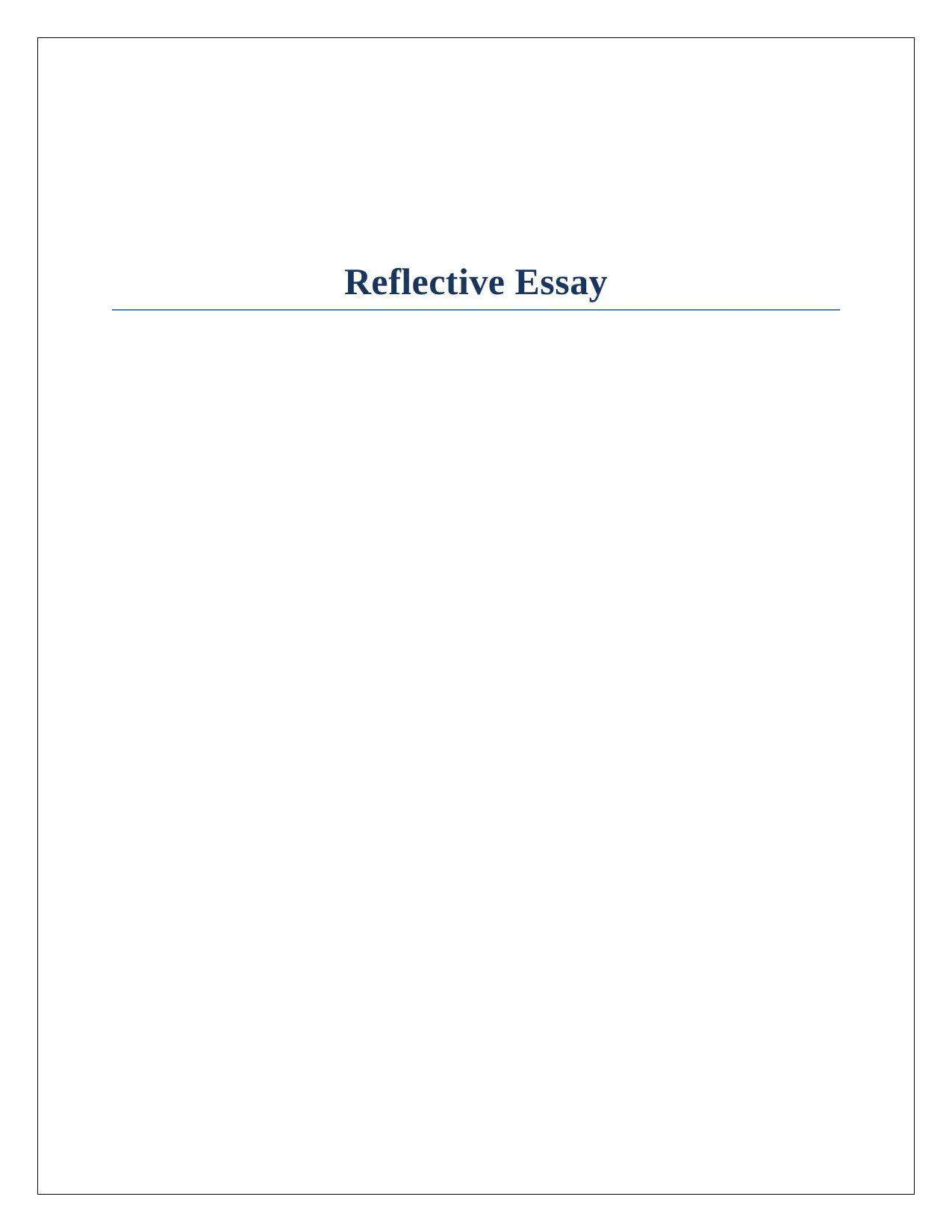
Reflective Essay
Paraphrase This Document
Need a fresh take? Get an instant paraphrase of this document with our AI Paraphraser
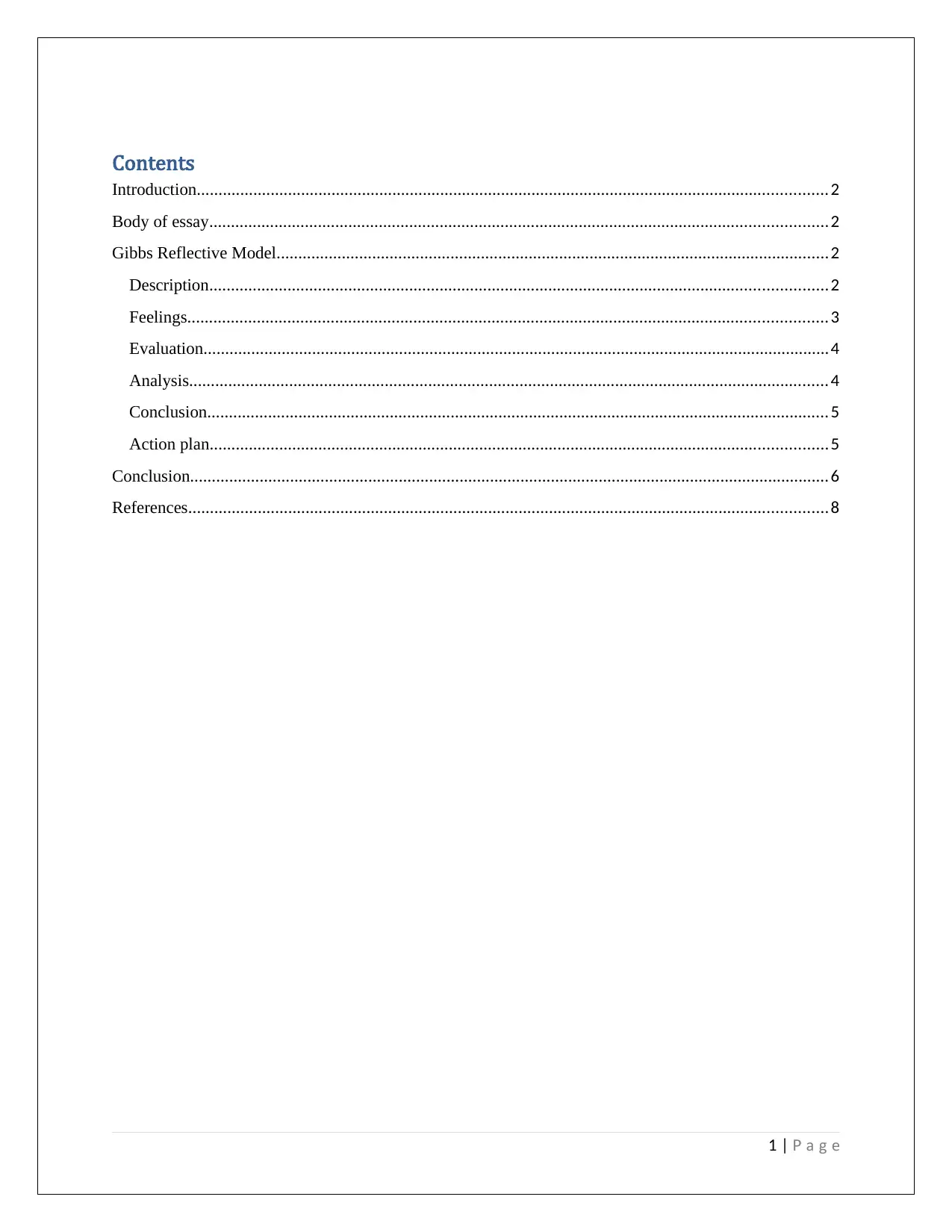
Contents
Introduction.................................................................................................................................................2
Body of essay..............................................................................................................................................2
Gibbs Reflective Model...............................................................................................................................2
Description..............................................................................................................................................2
Feelings................................................................................................................................................... 3
Evaluation................................................................................................................................................4
Analysis...................................................................................................................................................4
Conclusion...............................................................................................................................................5
Action plan..............................................................................................................................................5
Conclusion...................................................................................................................................................6
References...................................................................................................................................................8
1 | a g eP
Introduction.................................................................................................................................................2
Body of essay..............................................................................................................................................2
Gibbs Reflective Model...............................................................................................................................2
Description..............................................................................................................................................2
Feelings................................................................................................................................................... 3
Evaluation................................................................................................................................................4
Analysis...................................................................................................................................................4
Conclusion...............................................................................................................................................5
Action plan..............................................................................................................................................5
Conclusion...................................................................................................................................................6
References...................................................................................................................................................8
1 | a g eP
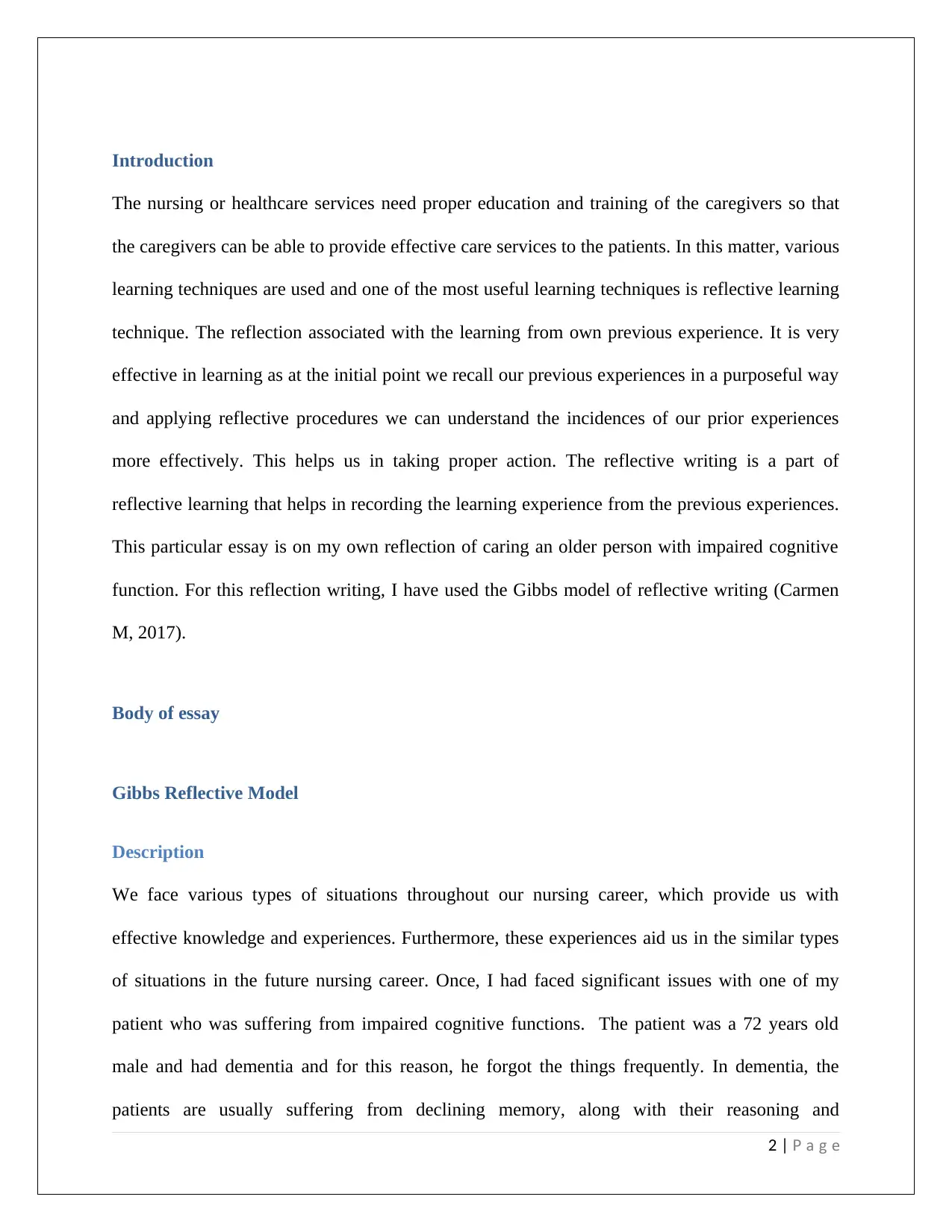
Introduction
The nursing or healthcare services need proper education and training of the caregivers so that
the caregivers can be able to provide effective care services to the patients. In this matter, various
learning techniques are used and one of the most useful learning techniques is reflective learning
technique. The reflection associated with the learning from own previous experience. It is very
effective in learning as at the initial point we recall our previous experiences in a purposeful way
and applying reflective procedures we can understand the incidences of our prior experiences
more effectively. This helps us in taking proper action. The reflective writing is a part of
reflective learning that helps in recording the learning experience from the previous experiences.
This particular essay is on my own reflection of caring an older person with impaired cognitive
function. For this reflection writing, I have used the Gibbs model of reflective writing (Carmen
M, 2017).
Body of essay
Gibbs Reflective Model
Description
We face various types of situations throughout our nursing career, which provide us with
effective knowledge and experiences. Furthermore, these experiences aid us in the similar types
of situations in the future nursing career. Once, I had faced significant issues with one of my
patient who was suffering from impaired cognitive functions. The patient was a 72 years old
male and had dementia and for this reason, he forgot the things frequently. In dementia, the
patients are usually suffering from declining memory, along with their reasoning and
2 | a g eP
The nursing or healthcare services need proper education and training of the caregivers so that
the caregivers can be able to provide effective care services to the patients. In this matter, various
learning techniques are used and one of the most useful learning techniques is reflective learning
technique. The reflection associated with the learning from own previous experience. It is very
effective in learning as at the initial point we recall our previous experiences in a purposeful way
and applying reflective procedures we can understand the incidences of our prior experiences
more effectively. This helps us in taking proper action. The reflective writing is a part of
reflective learning that helps in recording the learning experience from the previous experiences.
This particular essay is on my own reflection of caring an older person with impaired cognitive
function. For this reflection writing, I have used the Gibbs model of reflective writing (Carmen
M, 2017).
Body of essay
Gibbs Reflective Model
Description
We face various types of situations throughout our nursing career, which provide us with
effective knowledge and experiences. Furthermore, these experiences aid us in the similar types
of situations in the future nursing career. Once, I had faced significant issues with one of my
patient who was suffering from impaired cognitive functions. The patient was a 72 years old
male and had dementia and for this reason, he forgot the things frequently. In dementia, the
patients are usually suffering from declining memory, along with their reasoning and
2 | a g eP
⊘ This is a preview!⊘
Do you want full access?
Subscribe today to unlock all pages.

Trusted by 1+ million students worldwide
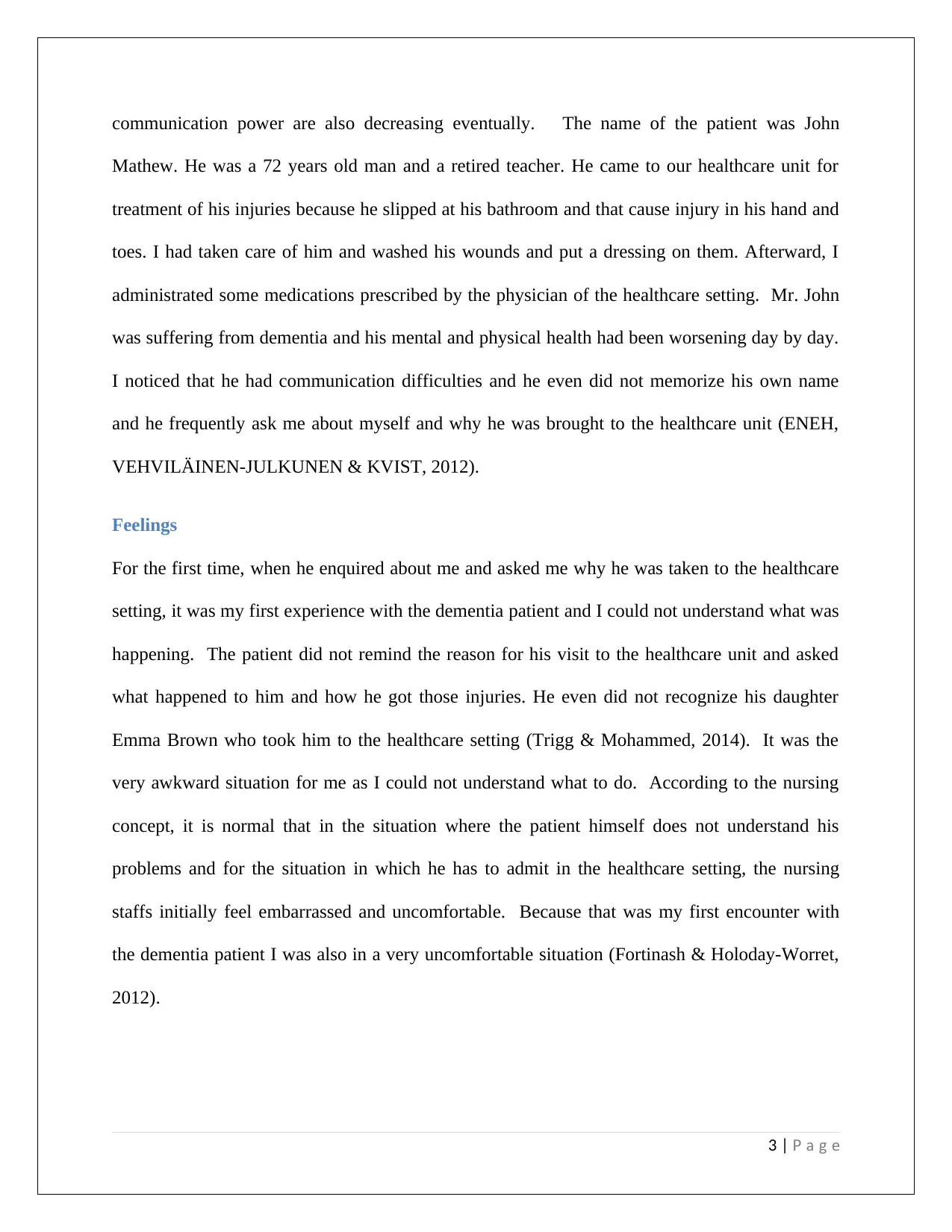
communication power are also decreasing eventually. The name of the patient was John
Mathew. He was a 72 years old man and a retired teacher. He came to our healthcare unit for
treatment of his injuries because he slipped at his bathroom and that cause injury in his hand and
toes. I had taken care of him and washed his wounds and put a dressing on them. Afterward, I
administrated some medications prescribed by the physician of the healthcare setting. Mr. John
was suffering from dementia and his mental and physical health had been worsening day by day.
I noticed that he had communication difficulties and he even did not memorize his own name
and he frequently ask me about myself and why he was brought to the healthcare unit (ENEH,
VEHVILÄINEN-JULKUNEN & KVIST, 2012).
Feelings
For the first time, when he enquired about me and asked me why he was taken to the healthcare
setting, it was my first experience with the dementia patient and I could not understand what was
happening. The patient did not remind the reason for his visit to the healthcare unit and asked
what happened to him and how he got those injuries. He even did not recognize his daughter
Emma Brown who took him to the healthcare setting (Trigg & Mohammed, 2014). It was the
very awkward situation for me as I could not understand what to do. According to the nursing
concept, it is normal that in the situation where the patient himself does not understand his
problems and for the situation in which he has to admit in the healthcare setting, the nursing
staffs initially feel embarrassed and uncomfortable. Because that was my first encounter with
the dementia patient I was also in a very uncomfortable situation (Fortinash & Holoday-Worret,
2012).
3 | a g eP
Mathew. He was a 72 years old man and a retired teacher. He came to our healthcare unit for
treatment of his injuries because he slipped at his bathroom and that cause injury in his hand and
toes. I had taken care of him and washed his wounds and put a dressing on them. Afterward, I
administrated some medications prescribed by the physician of the healthcare setting. Mr. John
was suffering from dementia and his mental and physical health had been worsening day by day.
I noticed that he had communication difficulties and he even did not memorize his own name
and he frequently ask me about myself and why he was brought to the healthcare unit (ENEH,
VEHVILÄINEN-JULKUNEN & KVIST, 2012).
Feelings
For the first time, when he enquired about me and asked me why he was taken to the healthcare
setting, it was my first experience with the dementia patient and I could not understand what was
happening. The patient did not remind the reason for his visit to the healthcare unit and asked
what happened to him and how he got those injuries. He even did not recognize his daughter
Emma Brown who took him to the healthcare setting (Trigg & Mohammed, 2014). It was the
very awkward situation for me as I could not understand what to do. According to the nursing
concept, it is normal that in the situation where the patient himself does not understand his
problems and for the situation in which he has to admit in the healthcare setting, the nursing
staffs initially feel embarrassed and uncomfortable. Because that was my first encounter with
the dementia patient I was also in a very uncomfortable situation (Fortinash & Holoday-Worret,
2012).
3 | a g eP
Paraphrase This Document
Need a fresh take? Get an instant paraphrase of this document with our AI Paraphraser
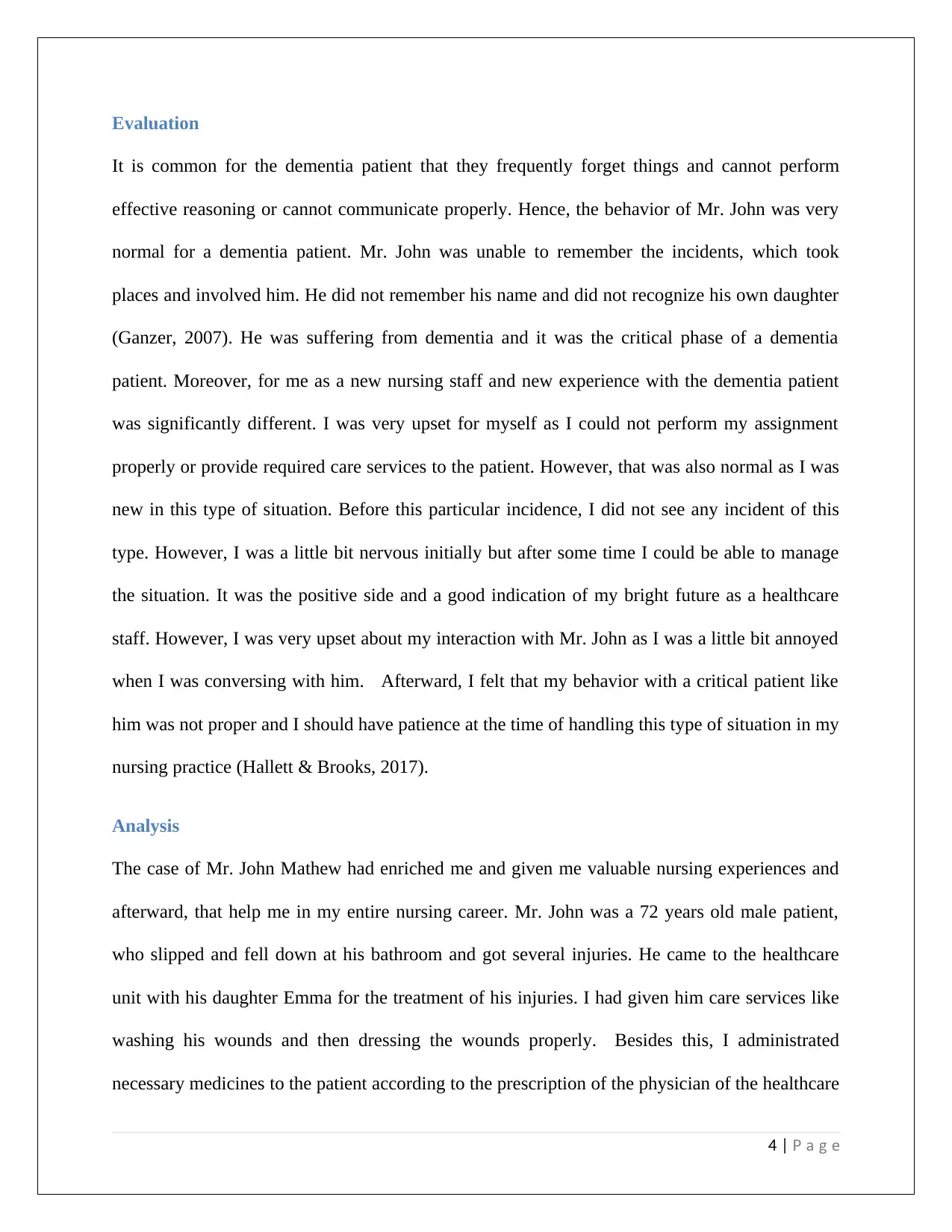
Evaluation
It is common for the dementia patient that they frequently forget things and cannot perform
effective reasoning or cannot communicate properly. Hence, the behavior of Mr. John was very
normal for a dementia patient. Mr. John was unable to remember the incidents, which took
places and involved him. He did not remember his name and did not recognize his own daughter
(Ganzer, 2007). He was suffering from dementia and it was the critical phase of a dementia
patient. Moreover, for me as a new nursing staff and new experience with the dementia patient
was significantly different. I was very upset for myself as I could not perform my assignment
properly or provide required care services to the patient. However, that was also normal as I was
new in this type of situation. Before this particular incidence, I did not see any incident of this
type. However, I was a little bit nervous initially but after some time I could be able to manage
the situation. It was the positive side and a good indication of my bright future as a healthcare
staff. However, I was very upset about my interaction with Mr. John as I was a little bit annoyed
when I was conversing with him. Afterward, I felt that my behavior with a critical patient like
him was not proper and I should have patience at the time of handling this type of situation in my
nursing practice (Hallett & Brooks, 2017).
Analysis
The case of Mr. John Mathew had enriched me and given me valuable nursing experiences and
afterward, that help me in my entire nursing career. Mr. John was a 72 years old male patient,
who slipped and fell down at his bathroom and got several injuries. He came to the healthcare
unit with his daughter Emma for the treatment of his injuries. I had given him care services like
washing his wounds and then dressing the wounds properly. Besides this, I administrated
necessary medicines to the patient according to the prescription of the physician of the healthcare
4 | a g eP
It is common for the dementia patient that they frequently forget things and cannot perform
effective reasoning or cannot communicate properly. Hence, the behavior of Mr. John was very
normal for a dementia patient. Mr. John was unable to remember the incidents, which took
places and involved him. He did not remember his name and did not recognize his own daughter
(Ganzer, 2007). He was suffering from dementia and it was the critical phase of a dementia
patient. Moreover, for me as a new nursing staff and new experience with the dementia patient
was significantly different. I was very upset for myself as I could not perform my assignment
properly or provide required care services to the patient. However, that was also normal as I was
new in this type of situation. Before this particular incidence, I did not see any incident of this
type. However, I was a little bit nervous initially but after some time I could be able to manage
the situation. It was the positive side and a good indication of my bright future as a healthcare
staff. However, I was very upset about my interaction with Mr. John as I was a little bit annoyed
when I was conversing with him. Afterward, I felt that my behavior with a critical patient like
him was not proper and I should have patience at the time of handling this type of situation in my
nursing practice (Hallett & Brooks, 2017).
Analysis
The case of Mr. John Mathew had enriched me and given me valuable nursing experiences and
afterward, that help me in my entire nursing career. Mr. John was a 72 years old male patient,
who slipped and fell down at his bathroom and got several injuries. He came to the healthcare
unit with his daughter Emma for the treatment of his injuries. I had given him care services like
washing his wounds and then dressing the wounds properly. Besides this, I administrated
necessary medicines to the patient according to the prescription of the physician of the healthcare
4 | a g eP
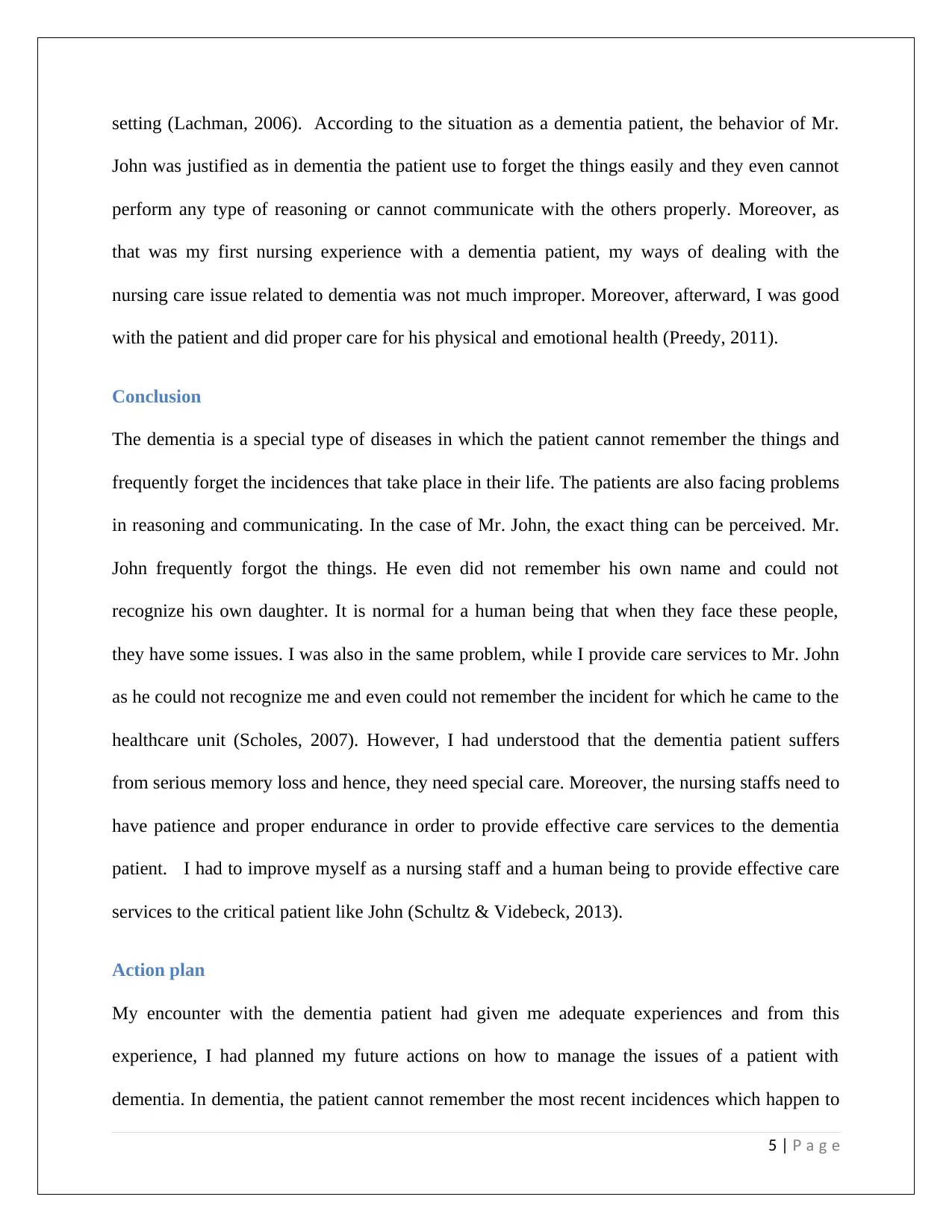
setting (Lachman, 2006). According to the situation as a dementia patient, the behavior of Mr.
John was justified as in dementia the patient use to forget the things easily and they even cannot
perform any type of reasoning or cannot communicate with the others properly. Moreover, as
that was my first nursing experience with a dementia patient, my ways of dealing with the
nursing care issue related to dementia was not much improper. Moreover, afterward, I was good
with the patient and did proper care for his physical and emotional health (Preedy, 2011).
Conclusion
The dementia is a special type of diseases in which the patient cannot remember the things and
frequently forget the incidences that take place in their life. The patients are also facing problems
in reasoning and communicating. In the case of Mr. John, the exact thing can be perceived. Mr.
John frequently forgot the things. He even did not remember his own name and could not
recognize his own daughter. It is normal for a human being that when they face these people,
they have some issues. I was also in the same problem, while I provide care services to Mr. John
as he could not recognize me and even could not remember the incident for which he came to the
healthcare unit (Scholes, 2007). However, I had understood that the dementia patient suffers
from serious memory loss and hence, they need special care. Moreover, the nursing staffs need to
have patience and proper endurance in order to provide effective care services to the dementia
patient. I had to improve myself as a nursing staff and a human being to provide effective care
services to the critical patient like John (Schultz & Videbeck, 2013).
Action plan
My encounter with the dementia patient had given me adequate experiences and from this
experience, I had planned my future actions on how to manage the issues of a patient with
dementia. In dementia, the patient cannot remember the most recent incidences which happen to
5 | a g eP
John was justified as in dementia the patient use to forget the things easily and they even cannot
perform any type of reasoning or cannot communicate with the others properly. Moreover, as
that was my first nursing experience with a dementia patient, my ways of dealing with the
nursing care issue related to dementia was not much improper. Moreover, afterward, I was good
with the patient and did proper care for his physical and emotional health (Preedy, 2011).
Conclusion
The dementia is a special type of diseases in which the patient cannot remember the things and
frequently forget the incidences that take place in their life. The patients are also facing problems
in reasoning and communicating. In the case of Mr. John, the exact thing can be perceived. Mr.
John frequently forgot the things. He even did not remember his own name and could not
recognize his own daughter. It is normal for a human being that when they face these people,
they have some issues. I was also in the same problem, while I provide care services to Mr. John
as he could not recognize me and even could not remember the incident for which he came to the
healthcare unit (Scholes, 2007). However, I had understood that the dementia patient suffers
from serious memory loss and hence, they need special care. Moreover, the nursing staffs need to
have patience and proper endurance in order to provide effective care services to the dementia
patient. I had to improve myself as a nursing staff and a human being to provide effective care
services to the critical patient like John (Schultz & Videbeck, 2013).
Action plan
My encounter with the dementia patient had given me adequate experiences and from this
experience, I had planned my future actions on how to manage the issues of a patient with
dementia. In dementia, the patient cannot remember the most recent incidences which happen to
5 | a g eP
⊘ This is a preview!⊘
Do you want full access?
Subscribe today to unlock all pages.

Trusted by 1+ million students worldwide
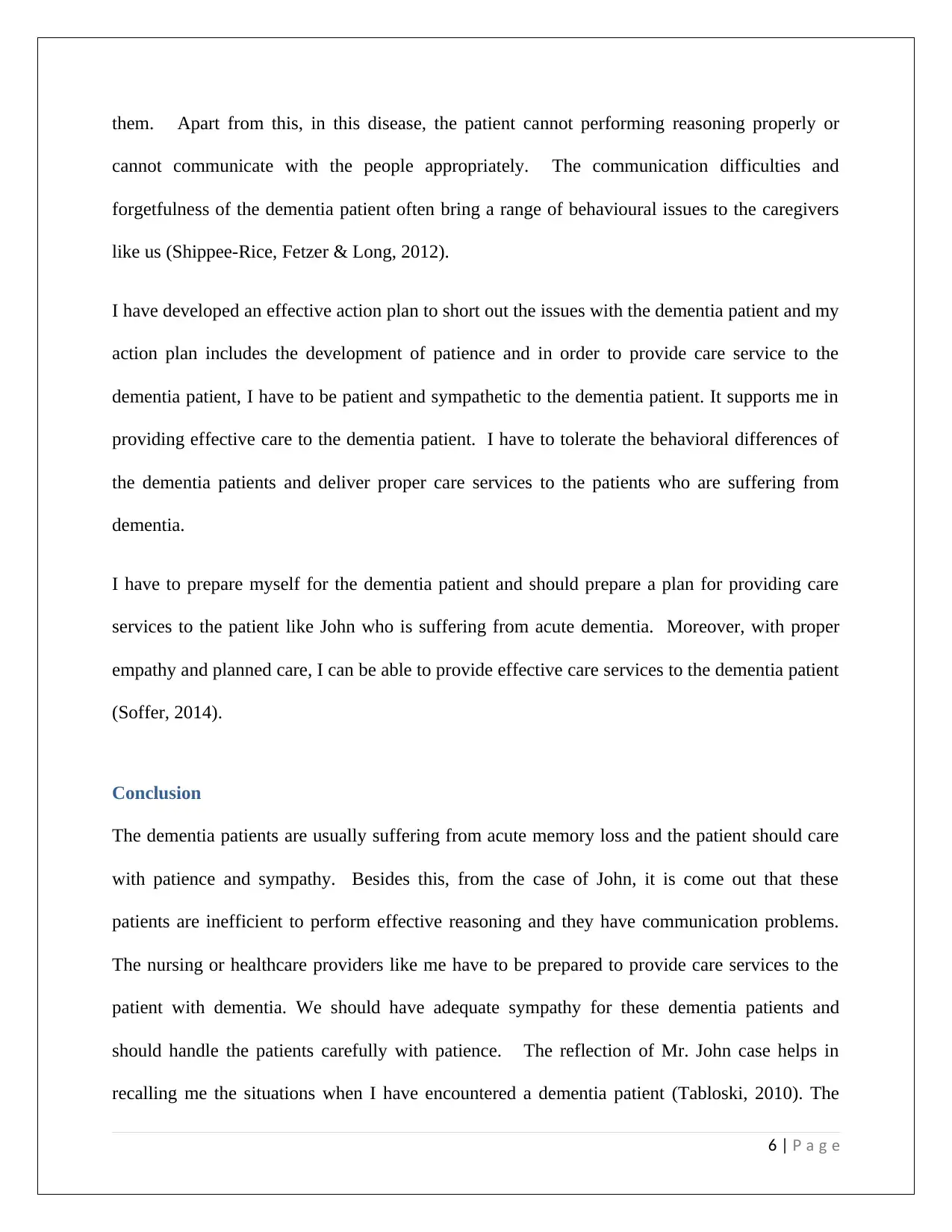
them. Apart from this, in this disease, the patient cannot performing reasoning properly or
cannot communicate with the people appropriately. The communication difficulties and
forgetfulness of the dementia patient often bring a range of behavioural issues to the caregivers
like us (Shippee-Rice, Fetzer & Long, 2012).
I have developed an effective action plan to short out the issues with the dementia patient and my
action plan includes the development of patience and in order to provide care service to the
dementia patient, I have to be patient and sympathetic to the dementia patient. It supports me in
providing effective care to the dementia patient. I have to tolerate the behavioral differences of
the dementia patients and deliver proper care services to the patients who are suffering from
dementia.
I have to prepare myself for the dementia patient and should prepare a plan for providing care
services to the patient like John who is suffering from acute dementia. Moreover, with proper
empathy and planned care, I can be able to provide effective care services to the dementia patient
(Soffer, 2014).
Conclusion
The dementia patients are usually suffering from acute memory loss and the patient should care
with patience and sympathy. Besides this, from the case of John, it is come out that these
patients are inefficient to perform effective reasoning and they have communication problems.
The nursing or healthcare providers like me have to be prepared to provide care services to the
patient with dementia. We should have adequate sympathy for these dementia patients and
should handle the patients carefully with patience. The reflection of Mr. John case helps in
recalling me the situations when I have encountered a dementia patient (Tabloski, 2010). The
6 | a g eP
cannot communicate with the people appropriately. The communication difficulties and
forgetfulness of the dementia patient often bring a range of behavioural issues to the caregivers
like us (Shippee-Rice, Fetzer & Long, 2012).
I have developed an effective action plan to short out the issues with the dementia patient and my
action plan includes the development of patience and in order to provide care service to the
dementia patient, I have to be patient and sympathetic to the dementia patient. It supports me in
providing effective care to the dementia patient. I have to tolerate the behavioral differences of
the dementia patients and deliver proper care services to the patients who are suffering from
dementia.
I have to prepare myself for the dementia patient and should prepare a plan for providing care
services to the patient like John who is suffering from acute dementia. Moreover, with proper
empathy and planned care, I can be able to provide effective care services to the dementia patient
(Soffer, 2014).
Conclusion
The dementia patients are usually suffering from acute memory loss and the patient should care
with patience and sympathy. Besides this, from the case of John, it is come out that these
patients are inefficient to perform effective reasoning and they have communication problems.
The nursing or healthcare providers like me have to be prepared to provide care services to the
patient with dementia. We should have adequate sympathy for these dementia patients and
should handle the patients carefully with patience. The reflection of Mr. John case helps in
recalling me the situations when I have encountered a dementia patient (Tabloski, 2010). The
6 | a g eP
Paraphrase This Document
Need a fresh take? Get an instant paraphrase of this document with our AI Paraphraser

reflective learning techniques support me in educating myself with my own previous nursing
experiences.
7 | a g eP
experiences.
7 | a g eP
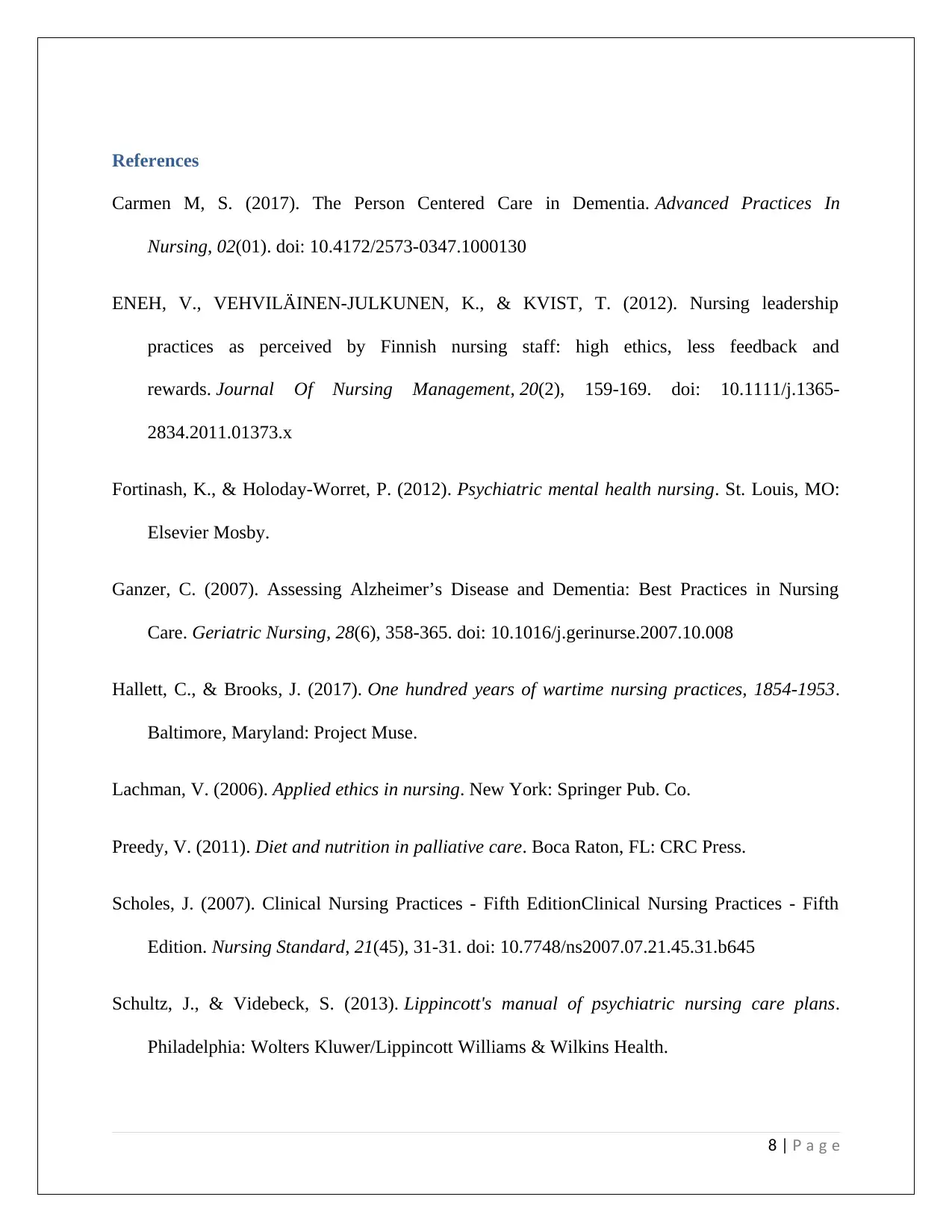
References
Carmen M, S. (2017). The Person Centered Care in Dementia. Advanced Practices In
Nursing, 02(01). doi: 10.4172/2573-0347.1000130
ENEH, V., VEHVILÄINEN-JULKUNEN, K., & KVIST, T. (2012). Nursing leadership
practices as perceived by Finnish nursing staff: high ethics, less feedback and
rewards. Journal Of Nursing Management, 20(2), 159-169. doi: 10.1111/j.1365-
2834.2011.01373.x
Fortinash, K., & Holoday-Worret, P. (2012). Psychiatric mental health nursing. St. Louis, MO:
Elsevier Mosby.
Ganzer, C. (2007). Assessing Alzheimer’s Disease and Dementia: Best Practices in Nursing
Care. Geriatric Nursing, 28(6), 358-365. doi: 10.1016/j.gerinurse.2007.10.008
Hallett, C., & Brooks, J. (2017). One hundred years of wartime nursing practices, 1854-1953.
Baltimore, Maryland: Project Muse.
Lachman, V. (2006). Applied ethics in nursing. New York: Springer Pub. Co.
Preedy, V. (2011). Diet and nutrition in palliative care. Boca Raton, FL: CRC Press.
Scholes, J. (2007). Clinical Nursing Practices - Fifth EditionClinical Nursing Practices - Fifth
Edition. Nursing Standard, 21(45), 31-31. doi: 10.7748/ns2007.07.21.45.31.b645
Schultz, J., & Videbeck, S. (2013). Lippincott's manual of psychiatric nursing care plans.
Philadelphia: Wolters Kluwer/Lippincott Williams & Wilkins Health.
8 | a g eP
Carmen M, S. (2017). The Person Centered Care in Dementia. Advanced Practices In
Nursing, 02(01). doi: 10.4172/2573-0347.1000130
ENEH, V., VEHVILÄINEN-JULKUNEN, K., & KVIST, T. (2012). Nursing leadership
practices as perceived by Finnish nursing staff: high ethics, less feedback and
rewards. Journal Of Nursing Management, 20(2), 159-169. doi: 10.1111/j.1365-
2834.2011.01373.x
Fortinash, K., & Holoday-Worret, P. (2012). Psychiatric mental health nursing. St. Louis, MO:
Elsevier Mosby.
Ganzer, C. (2007). Assessing Alzheimer’s Disease and Dementia: Best Practices in Nursing
Care. Geriatric Nursing, 28(6), 358-365. doi: 10.1016/j.gerinurse.2007.10.008
Hallett, C., & Brooks, J. (2017). One hundred years of wartime nursing practices, 1854-1953.
Baltimore, Maryland: Project Muse.
Lachman, V. (2006). Applied ethics in nursing. New York: Springer Pub. Co.
Preedy, V. (2011). Diet and nutrition in palliative care. Boca Raton, FL: CRC Press.
Scholes, J. (2007). Clinical Nursing Practices - Fifth EditionClinical Nursing Practices - Fifth
Edition. Nursing Standard, 21(45), 31-31. doi: 10.7748/ns2007.07.21.45.31.b645
Schultz, J., & Videbeck, S. (2013). Lippincott's manual of psychiatric nursing care plans.
Philadelphia: Wolters Kluwer/Lippincott Williams & Wilkins Health.
8 | a g eP
⊘ This is a preview!⊘
Do you want full access?
Subscribe today to unlock all pages.

Trusted by 1+ million students worldwide
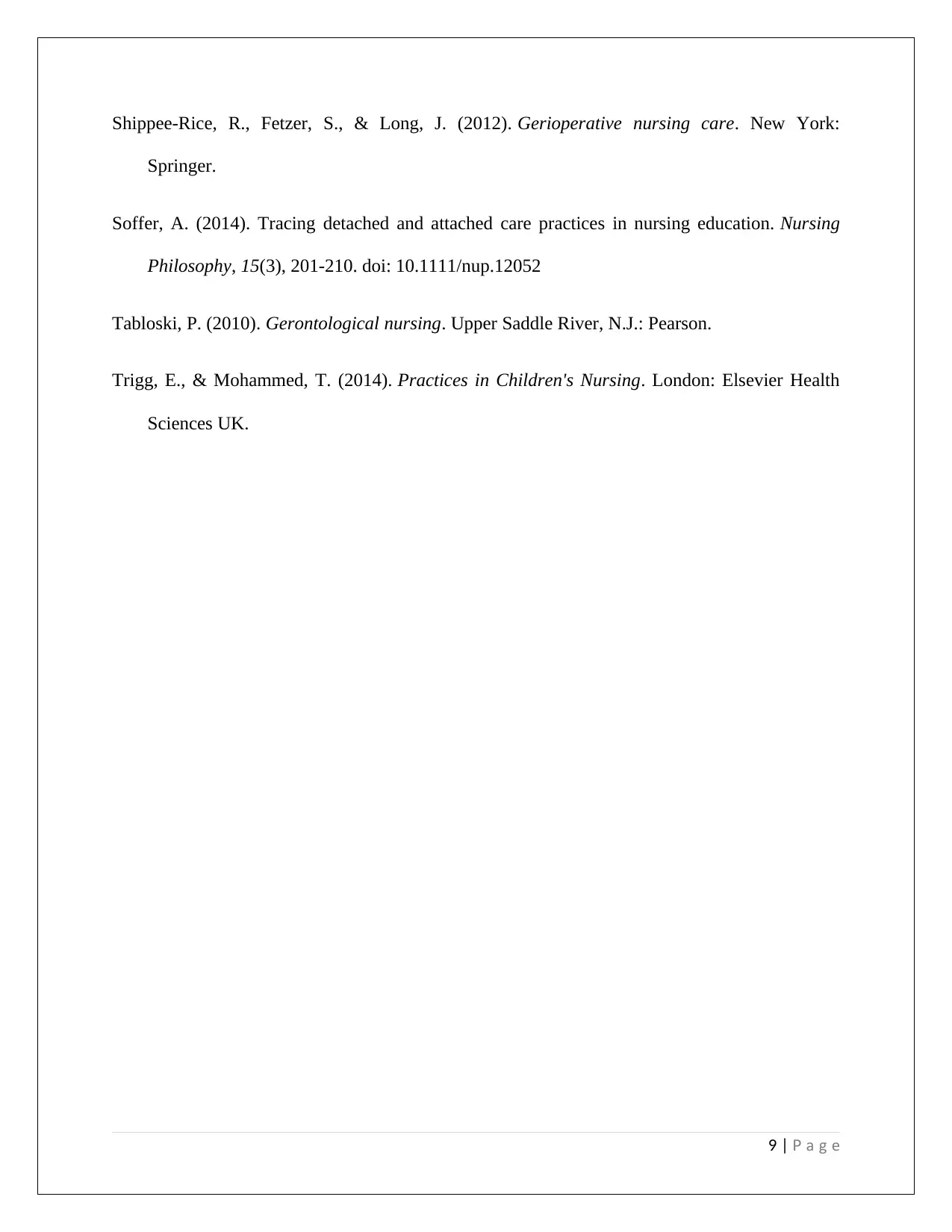
Shippee-Rice, R., Fetzer, S., & Long, J. (2012). Gerioperative nursing care. New York:
Springer.
Soffer, A. (2014). Tracing detached and attached care practices in nursing education. Nursing
Philosophy, 15(3), 201-210. doi: 10.1111/nup.12052
Tabloski, P. (2010). Gerontological nursing. Upper Saddle River, N.J.: Pearson.
Trigg, E., & Mohammed, T. (2014). Practices in Children's Nursing. London: Elsevier Health
Sciences UK.
9 | a g eP
Springer.
Soffer, A. (2014). Tracing detached and attached care practices in nursing education. Nursing
Philosophy, 15(3), 201-210. doi: 10.1111/nup.12052
Tabloski, P. (2010). Gerontological nursing. Upper Saddle River, N.J.: Pearson.
Trigg, E., & Mohammed, T. (2014). Practices in Children's Nursing. London: Elsevier Health
Sciences UK.
9 | a g eP
1 out of 10
Related Documents
Your All-in-One AI-Powered Toolkit for Academic Success.
+13062052269
info@desklib.com
Available 24*7 on WhatsApp / Email
![[object Object]](/_next/static/media/star-bottom.7253800d.svg)
Unlock your academic potential
Copyright © 2020–2026 A2Z Services. All Rights Reserved. Developed and managed by ZUCOL.





